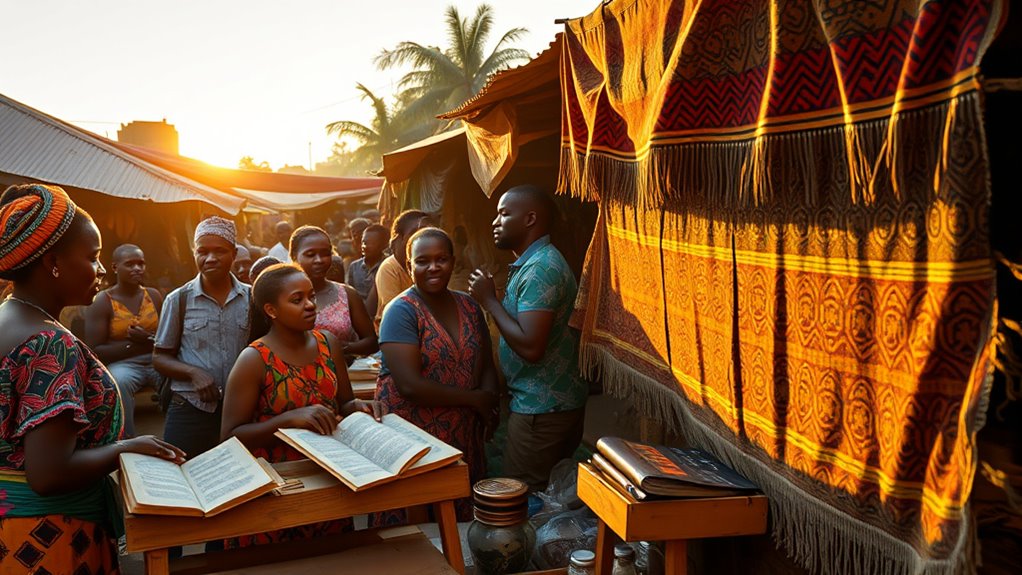Arabic to Twi translation services in Ghana, such as those from Translation Africa, bridge cultural and linguistic divides between Arabic-speaking communities and Twi-dominant groups. Rooted in the histories of Semitic Arabic and Niger-Congo Twi, these services address challenges like grammatical differences and cultural nuances to guarantee accurate communication in education, business, and religion. Benefits include enhanced mutual understanding and societal progress, with professional tools promoting efficiency. Further options highlight emerging trends and applications.
Quick Summaries
- Professional translation services in Ghana specialize in converting Arabic texts to Twi, ensuring cultural accuracy and reliability.
- These services bridge cultural gaps, facilitating communication between Arabic-speaking communities and Twi-dominant regions in Ghana.
- Expert linguists address challenges like grammatical differences and tonal variations for precise Arabic to Twi conversions.
- Advanced digital tools, including AI platforms, enhance efficiency in script conversion and vocabulary adaptation for Twi speakers.
- Applications include business negotiations, education, and religious texts, promoting mutual understanding and economic growth in Ghana.
History of Arabic and Twi Languages

The history of Arabic and Twi languages reflects their distinct origins and evolutions. Arabic, a Semitic language, emerged in the Arabian Peninsula around the 6th century CE, profoundly influenced by pre-Islamic poetry and the Quran. It spread rapidly through Islamic expansion, trade routes, and scholarly exchanges, evolving into various dialects across North Africa, the Middle East, and beyond. Classical Arabic remains central to religious and literary traditions, while Modern Standard Arabic serves contemporary communication.
In contrast, Twi belongs to the Akan language group within the Niger-Congo family, originating in West Africa. It developed among the Akan people, including the Ashanti and Fante ethnic groups in Ghana, over centuries of oral traditions, migration, and cultural exchanges. Twi’s evolution was shaped by local kingdoms, colonial influences, and interactions with neighboring languages, resulting in dialects like Asante Twi and Akuapem Twi. Today, it plays an essential role in Ghanaian identity and education.
Reasons for Arabic to Twi Translation in Ghana

Several factors motivate Arabic to Twi translation in Ghana, primarily stemming from cultural, religious, and educational needs. Culturally, it bridges the gap between Ghana’s diverse ethnic groups and Arabic-speaking communities, fostering mutual understanding and preserving shared heritage through translated folklore and traditions. Religiously, with Islam’s significant presence in Ghana, translating Arabic texts like the Quran into Twi enables wider accessibility for non-Arabic speakers, enhancing spiritual engagement and community cohesion. Educationally, it supports language learning in schools and universities, where Arabic studies promote bilingualism and global awareness, aiding students in fields such as international relations and linguistics. This translation effort enriches Ghana’s linguistic landscape, encouraging cross-cultural dialogue and knowledge exchange without overlooking local dialects’ nuances. Overall, these motivations underscore translation’s role in societal advancement.
Challenges in Cross-Language Translation

While motivations for Arabic to Twi translation in Ghana emphasize its benefits, cross-language efforts encounter obstacles such as linguistic differences in grammar and syntax, which can distort meanings and hinder accurate conveyance of cultural nuances. Arabic’s Semitic structure, with its complex root systems and right-to-left script, contrasts sharply with Twi’s tonal Niger-Congo framework, often leading to misinterpretations of subtleties like verb conjugations or idiomatic expressions. Additionally, vocabulary gaps exacerbate issues; Arabic terms rooted in Islamic traditions may lack direct equivalents in Twi, risking cultural dilution or offense. Translators must navigate these barriers, including phonological mismatches where Twi’s tones alter word meanings, potentially causing confusion in contexts like education or diplomacy. Overall, these challenges underscore the need for meticulous adaptation to preserve intent and authenticity.
Professional Translation Services Available
In Ghana, professional translation services for Arabic to Twi are readily available, offering various options to meet diverse needs. These services employ skilled language specialists who are proficient in both languages and cultural nuances. The benefits include accurate communication, enhanced accessibility, and efficient handling of translation projects.
Translation Options
Professional translation services in Ghana offer reliable options for Arabic to Twi conversions, employing skilled linguists to guarantee accuracy and cultural appropriateness. These services encompass a variety of formats, including certified document translations for legal, business, and personal needs, as well as website localization to adapt digital content seamlessly. Audio-visual subtitling and transcription options cater to media and educational sectors, ensuring messages resonate with Twi-speaking audiences. Clients can choose flexible delivery methods, such as online platforms for quick uploads and real-time processing, or customized packages for larger projects. Rush services handle urgent requests without sacrificing quality, while standard options provide cost-effective solutions. Quality checks and revisions are standard, maintaining high standards across all translations. This range of choices makes Arabic to Twi services adaptable and efficient in Ghana’s dynamic context.
Language Specialists
Language specialists in Ghana drive the quality of Arabic to Twi translations, leveraging deep expertise in linguistics and cultural nuances to deliver precise results. These professionals, often certified linguists or translators with advanced degrees, possess fluency in both Arabic and Twi, ensuring accurate conveyance of complex texts. In Ghana’s diverse linguistic landscape, they navigate regional dialects and idiomatic expressions, maintaining fidelity to original meanings. Many specialists collaborate with translation agencies like Translation Africa, where rigorous quality checks and peer reviews refine outputs. Their proficiency extends to various fields, such as legal, medical, and literary translations, drawing on years of specialized training. By adhering to international standards, these experts facilitate seamless communication, though availability varies by location and project demands. This focused approach underscores their essential role in bridging language gaps.
Service Benefits
The contributions of language specialists in Arabic to Twi translations extend to tangible benefits of professional services, including enhanced accuracy, cultural fidelity, and streamlined communication for users in Ghana. Professional translation services guarantee precise interpretations that preserve the nuances of Arabic texts, making them culturally resonant in Twi-speaking contexts. This fidelity fosters better cross-cultural understanding, particularly in education, business, and diplomacy. For instance, accurate translations aid Ghanaian institutions in engaging with Arabic-speaking partners, reducing errors that could lead to miscommunications. Additionally, these services offer efficiency through certified experts who use advanced tools, saving time and resources. In Ghana’s diverse linguistic landscape, such benefits promote inclusivity and effective collaboration, ultimately driving economic and social progress. Overall, opting for professional Arabic to Twi translation services delivers reliable, high-quality results that enhance global connectivity.
Advantages of Language Conversion Services
As cross-cultural interactions expand in Ghana, particularly for Arabic to Twi translations, these services enhance communication by bridging linguistic gaps and fostering mutual understanding among diverse communities. Language conversion services offer several practical advantages, including streamlined business operations where accurate translations facilitate trade agreements and negotiations, driving economic progress. In educational settings, they enable the effective transfer of knowledge from Arabic sources to Twi speakers, expanding access to global resources without distortion. These services also guarantee reliability in professional fields like healthcare and law, minimizing miscommunications that could lead to costly errors. By delivering fast, cost-effective solutions through technology, they optimize time management and resource allocation. Moreover, they support everyday interactions, promoting inclusivity and efficiency in a multilingual society, ultimately boosting productivity and collaboration.
Cultural Aspects in Translation Processes
The translation of Arabic to Twi in Ghana involves cultural aspects that shape the process’s effectiveness. Cultural nuances impact how meanings are accurately conveyed between the two languages. Language cultural integration and adaptation challenges require translators to navigate potential barriers carefully.
Cultural Nuances Impact
How do cultural nuances shape Arabic to Twi translation in Ghana? Cultural nuances profoundly influence this process by highlighting differences in social norms, religious expressions, and symbolic meanings between Arabic and Twi cultures. Translators must navigate Arabic’s emphasis on formal hierarchies and Islamic references, adapting them to Twi’s Akan traditions, such as ancestral reverence and communal proverbs, to preserve intent without distortion. For instance, idiomatic phrases in Arabic, often tied to desert life or poetry, require rephrasing to resonate with Twi speakers’ rural and agricultural contexts, preventing miscommunication. This adaptation demands cultural expertise, as overlooking subtleties like gender roles or taboos can alter the message’s essence. Ultimately, addressing these nuances guarantees translations bridge divides, enhancing comprehension in Ghana’s diverse settings while maintaining authenticity.
Language Cultural Integration
Language cultural integration in translation processes involves weaving cultural elements into linguistic adaptations, particularly for Arabic to Twi in Ghana, where translators balance authenticity with local relevance. This approach guarantees that Arabic concepts, such as traditional proverbs or religious idioms, are seamlessly incorporated into Twi’s rich oral heritage, fostering mutual understanding. Translators often draw on Ghana’s diverse cultural landscape, including Akan traditions, to reframe Arabic narratives in ways that resonate with local audiences. For instance, metaphors from Islamic texts might be aligned with Twi folklore, preserving the original intent while enhancing accessibility. Such integration promotes cultural exchange, as seen in educational and community settings, where translated materials bridge gaps between Arab and Ghanaian societies. Ultimately, this method enriches both languages, encouraging appreciation for their interconnected histories and shared human experiences. (124 words)
Adaptation Challenges Faced
Adapting cultural elements from Arabic to Twi translation presents notable challenges, particularly in Ghana’s diverse linguistic landscape. Translators often encounter difficulties with idiomatic expressions, where Arabic proverbs rooted in Islamic traditions lack direct equivalents in Twi, potentially altering intended meanings. For instance, references to desert life or historical events in Arabic may not resonate with Twi speakers, who draw from Ghanaian customs like festivals and kinship systems. This mismatch can lead to cultural insensitivity or misinterpretation, as seen in religious texts where nuances of prayer and morality require careful adaptation. In Ghana’s multilingual context, maintaining authenticity demands collaboration with local experts to bridge gaps, ensuring translations respect both source and target cultures without imposing foreign concepts. Ultimately, these challenges highlight the need for culturally informed strategies to preserve original intent while fostering cross-cultural understanding.
Tools for Accurate Arabic to Twi Conversion
Effective tools are essential for precise Arabic to Twi translations, addressing the complexities of script, grammar, and cultural nuances. In Ghana, digital platforms like advanced translation software leverage machine learning algorithms to bridge the gap between Arabic’s right-to-left script and Twi’s Latin-based system, ensuring accurate character rendering. Professional online tools, such as specialized apps and databases, incorporate contextual databases that account for Twi’s tonal variations and Arabic’s intricate morphology, minimizing errors. Bilingual dictionaries and AI-driven interfaces further enhance reliability by integrating cultural references, like Ghanaian proverbs or Islamic terminology, to preserve meaning. These resources empower translators in Ghana’s multilingual landscape, fostering better communication in business, education, and community interactions without compromising fidelity. Ultimately, such tools promote efficiency and cultural sensitivity in an evolving global context. (124 words)
Step-by-Step Translation Methods
The step-by-step translation methods for Arabic to Twi in Ghana outline the translation process, which involves systematic stages from source text analysis to final rendering. Language adaptation techniques address nuances such as cultural idioms and grammatical differences to maintain fidelity. Together, these methods enhance the accuracy and usability of translated content in diverse contexts.
Translation Process
Translators in Ghana adopt structured methods for Arabic-to-Twi conversion, guaranteeing fidelity to the original text while adapting to cultural nuances. The process begins with a thorough analysis of the Arabic source material, where experts break down linguistic elements like vocabulary, syntax, and idioms. This step involves creating a detailed glossary to capture precise meanings. Translators then proceed to a literal draft, converting text word-for-word while noting potential ambiguities. Subsequent refinement includes multiple reviews to enhance readability and coherence in Twi. Collaboration with native speakers ensures accuracy, followed by proofreading for grammatical errors and consistency. Throughout, tools like translation software aid efficiency, but human judgment remains central. This methodical approach minimizes distortions, delivering high-quality results for diverse applications in Ghana. (124 words)
Language Adaptation Techniques
Language adaptation in Arabic-to-Twi translation employs targeted techniques to refine the step-by-step process, focusing on cultural and linguistic adjustments. Translators first analyze Arabic text for idiomatic expressions, then seek equivalent Twi phrases that resonate with Ghanaian contexts, such as adapting religious terms to local spiritual concepts. This involves domestication, where foreign elements are rephrased to align with Twi cultural norms, ensuring natural flow and comprehension. For instance, Arabic proverbs may be transformed into parallel Twi sayings to maintain rhetorical impact. Grammatical shifts, like converting Arabic’s complex verb forms to Twi’s subject-verb-object structure, enhance readability. Equivalence strategies, including transliteration for proper names, preserve meaning while avoiding literal pitfalls. Overall, these methods bridge linguistic gaps, fostering accurate and culturally sensitive communication in Ghana’s diverse settings. This approach not only improves translation quality but also promotes cross-cultural understanding in professional contexts.
Business Applications of Language Translation
Business applications of Arabic to Twi translation in Ghana have expanded substantially, enabling smoother trade between Arabic-speaking regions and Twi-dominant markets. This linguistic bridge facilitates effective communication in key sectors such as import-export, where accurate translations of contracts and negotiations reduce misunderstandings and build trust. In marketing, businesses adapt Arabic content for Twi-speaking consumers, enhancing product appeal and market penetration in Ghana’s diverse economy. Additionally, translation services streamline supply chain operations, allowing companies to navigate regulatory documents and cultural nuances more efficiently. By integrating advanced translation tools, firms minimize errors in financial transactions and partnerships, fostering long-term economic ties. Overall, these applications drive competitiveness and innovation, positioning Ghana as a key link in Africa-Arab business networks. This strategic use of language translation optimizes operations while promoting inclusive growth in a globalized context.
Real-World Examples of Successful Translations
In Ghana, successful Arabic to Twi translations have facilitated key trade deals, such as a major import agreement between a Saudi supplier and a local Ghanaian distributor, where accurate rendering of contract terms prevented potential disputes and guaranteed smooth execution. Beyond commerce, these translations have enhanced educational exchanges, enabling Ghanaian students to access Arabic texts on Islamic history through precise Twi versions, fostering cultural understanding. In healthcare, a critical public health campaign translated Arabic medical guidelines into Twi, allowing rural communities to implement preventive measures effectively during a regional outbreak. Such instances underscore the role of reliable translation in bridging linguistic divides, promoting collaboration in diplomacy and community development, and ensuring information flows seamlessly across diverse groups in Ghana.
Tips for High-Quality Language Work
Achieving high-quality language work demands precision and cultural sensitivity, particularly in translations like those from Arabic to Twi. Professional translators must deeply understand both source and target languages, guaranteeing accurate conveyance of idioms and nuances to avoid misinterpretations. Employing native speakers of Twi helps capture regional dialects and cultural contexts, enhancing authenticity. Consistency in terminology is vital; using glossaries and style guides maintains uniformity across documents. Thorough proofreading by multiple experts minimizes errors, while leveraging translation tools can aid efficiency without compromising quality. Regular training keeps translators updated on linguistic evolutions, fostering excellence. Ethical considerations, such as confidentiality and respect for cultural elements, further elevate the work. Ultimately, collaboration and attention to detail guarantee translations bridge communication gaps effectively in Ghana’s diverse landscape.
Educational Uses of Translation Services
Translation services play a pivotal role in education by facilitating access to diverse linguistic resources, such as Arabic texts translated into Twi, which enables Ghanaian students to engage with global knowledge. In Ghana, these services integrate into classrooms, promoting cultural understanding and academic equity. They help overcome language barriers, enriching curricula and supporting inclusive learning.
- Ignites curiosity: Students discover ancient Arabic wisdom in Twi, sparking wonder and a thirst for exploration.
- Fosters empowerment: Translated materials build confidence, allowing learners to connect deeply with their heritage and global narratives.
- Evokes pride: Accessing knowledge in native tongues instills a sense of identity and accomplishment among young minds.
- Inspires inclusivity: It bridges divides, touching hearts by making education accessible to all, regardless of linguistic background.
- Awakens passion: These tools transform learning into an emotional journey, motivating students to pursue broader horizons.
Emerging Trends in Global Translation
Global advancements in artificial intelligence and machine learning are revolutionizing translation services, enabling faster and more accurate cross-language communication. Neural machine translation systems, powered by deep learning algorithms, are increasingly dominating the field, offering real-time capabilities that support global business and diplomacy. The integration of big data analytics allows for continuous improvement of translation accuracy by analyzing vast linguistic datasets. Additionally, mobile apps and wearable devices are making on-the-go translation accessible, bridging language barriers in everyday scenarios. In regions like Africa, these trends are accelerating the development of specialized tools for less common languages, such as Arabic to Twi conversions. This evolution enhances efficiency without replacing human expertise, fostering reliable multilingual interactions in professional settings. Overall, these innovations are reshaping how languages connect in a digital world.
Ways Translation Fosters Cultural Exchange
How does translation bridge cultural divides? Translation serves as an essential conduit for cultural exchange, particularly in diverse contexts like Arabic to Twi in Ghana, enabling mutual understanding and appreciation. It dismantles language barriers, allowing ideas, stories, and traditions to flow freely, fostering empathy and global connections.
- Ignites empathy: Hearing Arabic tales in Twi evokes shared human struggles, stirring deep emotional resonance.
- Preserves heritage: Translated folklore awakens pride and nostalgia, connecting generations to their roots.
- Builds unity: Exchanging proverbs bridges divides, evoking a sense of belonging and collective joy.
- Sparks curiosity: New linguistic insights inspire wonder and excitement about unfamiliar worlds.
- Heals divides: Stories of resilience in translated forms provoke tears and hope, mending societal rifts.
Frequently Asked Questions
How Much Does Arabic to Twi Translation Cost?
The question pertains to the cost of translating from Arabic to Twi. Such services typically vary based on factors like word count, complexity, and provider expertise. Prices often range from $0.05 to $0.20 per word, though rates may differ by agency or project specifics.
What Is the Typical Turnaround Time for Translations?
The typical turnaround time for translations varies based on factors such as the volume of text, subject matter expertise required, and translator workload. For standard projects, it often ranges from 24 hours to one week.
Are Translations Certified for Official Use?
The question of whether translations are certified for official use is essential for users needing verified documents. Generally, certified translations are handled by qualified experts who affix seals or stamps to confirm authenticity and accuracy.
Can I Translate Personal Documents Myself?
Individuals may wonder if translating personal documents themselves is permissible. While self-translation works for informal purposes, official use typically requires certified professionals to guarantee accuracy, validity, and legal compliance in various contexts.
How Do I Find a Reliable Translator in Ghana?
Finding a reliable translator in Ghana involves researching certified professionals through online directories and local associations. One should verify credentials, check client reviews, confirm language expertise, and seek referrals from trusted sources to guarantee accurate services.



